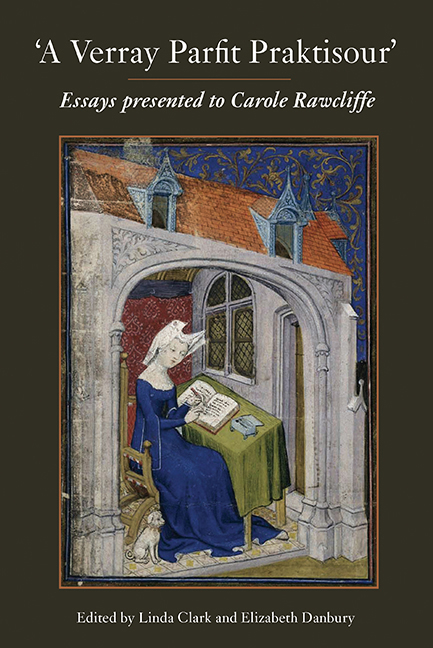Book contents
- Frontmatter
- Contents
- List of Illustrations
- List of Contributors
- Acknowledgements
- Abbreviations
- Tributes
- 1 Coslania, Norwich: an Archaeological Contribution to Early Medieval Urban History
- 2 A Queen in Rebel London, 1215–17
- 3 Defensive Officials and Defensive Levies in Fourteenth-Century Muster Rolls: an East Anglian Perspective
- 4 Lettice Oo? Queen Isabella's Accidental Apothecary
- 5 The First Instrument of Medicine: Diet and Regimens of Health in Late Medieval England
- 6 Politics and Piety: Norwich City Churches, Commemoration and Networking for the Afterlife
- 7 Telling the Time in Chaucer's London
- 8 The Bankrupt Bibliophile, William Paston, 2nd Earl of Yarmouth (1654–1732)
- 9 Ottomans, Neo-Ottomans and Invented Tradition in Hospital Music Therapy
- The Published Works of Carole Rawcliffe, 1976–2016
- Index
- Tabula Gratulatoria
4 - Lettice Oo? Queen Isabella's Accidental Apothecary
Published online by Cambridge University Press: 09 May 2017
- Frontmatter
- Contents
- List of Illustrations
- List of Contributors
- Acknowledgements
- Abbreviations
- Tributes
- 1 Coslania, Norwich: an Archaeological Contribution to Early Medieval Urban History
- 2 A Queen in Rebel London, 1215–17
- 3 Defensive Officials and Defensive Levies in Fourteenth-Century Muster Rolls: an East Anglian Perspective
- 4 Lettice Oo? Queen Isabella's Accidental Apothecary
- 5 The First Instrument of Medicine: Diet and Regimens of Health in Late Medieval England
- 6 Politics and Piety: Norwich City Churches, Commemoration and Networking for the Afterlife
- 7 Telling the Time in Chaucer's London
- 8 The Bankrupt Bibliophile, William Paston, 2nd Earl of Yarmouth (1654–1732)
- 9 Ottomans, Neo-Ottomans and Invented Tradition in Hospital Music Therapy
- The Published Works of Carole Rawcliffe, 1976–2016
- Index
- Tabula Gratulatoria
Summary
Perhaps the single most distinctive characteristic of the work of the medieval English apothecary, and one that set him apart from the other medical practitioners of the age, was its essentially mercantile nature. If some apothecaries owned learned books, such as the Antidotarium of Nicholas of Salerno, or compiled their own collections of medical recipes, perhaps with a view to passing them down to future generations, they, unlike contemporary physicians, had nevertheless usually not studied at a university, but had undergone a practical apprenticeship in another merchant's shop. Where other practitioners marketed their otherwise intangible learning and expert knowledge, the apothecary sold commodities that were both tangible and measureable. This provided a dividing line not only from the university-trained elite, but also from the often also practically trained barbers and surgeons. The differentiation was actively encouraged and defended by the university-educated physicians, who – whether out of a genuine concern for the provision of medical care, or out of less high-minded financial motives – sought to preclude those lacking a proper education from taking a part in diagnosis and prescription.
The apothecary's trade had its origins in that of the pepperers and spicers – that is, the wholesale importers of spices – and while as early as 1312 a London ordinance recognised the apothecaries as a distinct sub-branch of the mistery, the boundaries between those specialising in medicinal remedies and those trading in spices more generally remained blurred. Indeed, the central place in Hippocratic and Galenic medical theory of the concept of the balance of the four humours, which, if disturbed, could be restored by dietary adjustments and supplements, meant that the distinction between simple medicines and other spices was itself an imprecise one. Many late medieval apothecaries used the styles of ‘grocer’ and ‘apothecary’ interchangeably, and it is often a merchant's adoption of the style of ‘apothecary’ which alerts us to the more specialised nature of his trade.
An interesting, if unintended, consequence of the separation of the apothecary's trade from the university-trained branch of the medical profession was that it, apparently in common with the surgeon's craft, but unlike that of the physician, was, and continued to be, comparatively open to women. While they were excluded from the universities, girls could be apprenticed to grocers, spicers and apothecaries as readily as to other merchants.
- Type
- Chapter
- Information
- A Verray Parfit PraktisourEssays presented to Carole Rawcliffe, pp. 85 - 98Publisher: Boydell & BrewerPrint publication year: 2017



